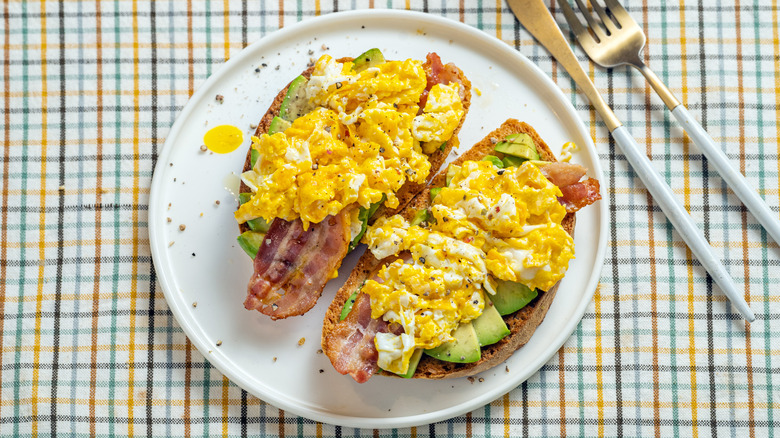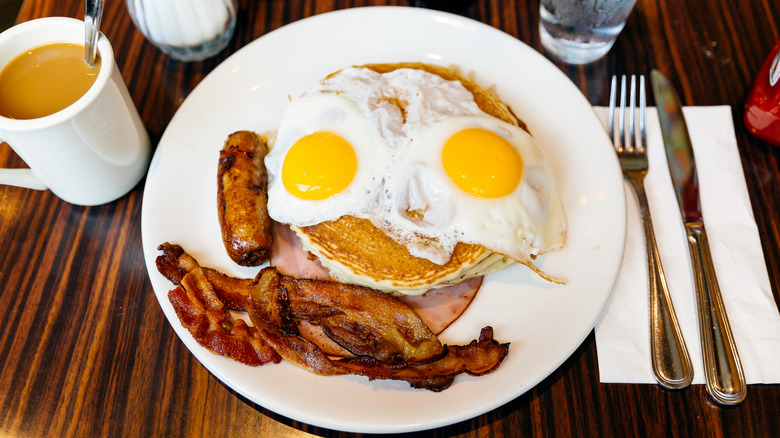How Eggs Became A Staple Breakfast Food
We all know that Gaston eats five dozen eggs every morning to help him beef up ... but the "Beauty and the Beast" villain certainly isn't an exemplary role model in any other sense. So is it really a good idea to default to (perhaps a slightly smaller amount of) eggs for a morning meal? And how did they become so entirely ubiquitous with the concept of breakfast? As it turns out, it began far, far before Disney Animation was even a thought.
Hens were domesticated in Asia around 3,500 years ago, providing meat and eggs to communities. The small animal then slowly moved westward, reaching Europe about 2,800 years ago, and Africa a little later. Eggs are part of many long-standing traditional meals across the world, from Japan, to Spain, to Ghana, to Hawaii, to even the sustaining fare of ancient Romans. But although eggs were always beloved, breakfast wasn't: In fact, there was a time when eating too early in the day was considered gluttony by the Catholic Church.
Breakfast as we know it wasn't truly popularized in Europe until around the 17th century. The idea further grew in commonality when the Industrial Revolution began in the 19th century. Longer work hours required more energy, and left less time in the midday hours to sit down for a long, hearty meal — leading to more calories and more protein being added into workers' morning routines. From there, it wasn't so much that eggs were eventually added into the breakfast rotation as it was that eggs were always a top option for the meal; packed with protein, high in calories, and quick to make, two eggs (poached) were even recommended as the morning meal by medical writer Tobias Venner in 1620. Ultimately, eggs come with a seemingly endless variety of preparation methods, making them a likely breakfast candidate to stick around for as long as breakfast endures (that is, unless rising egg prices throw a wrench in their popularity).
Eggs in American breakfast culture
American food tends to look a little different than European food — we're certainly not serving up Gordon Ramsay's easy twist on upgraded beans on toast on a regular basis. And yet, eggs are a common breakfast denominator. So how exactly did the joy and commonality of a sunny-side-up egg on a breakfast plate transcend cultural bounds and cross international borders? First, they had to get past the carb-loaded American cereals that were loved for their ease of preparation — a good way for kids, especially those with working mothers, to feed themselves in the mornings without the risk of using the stovetop.
This was helped along by a 1920s marketing campaign that successfully paired bacon and eggs as the perfect breakfast duo, majoring on thousands of doctors' agreement that a heartier breakfast was healthier than lighter cereal-based options. Nowadays, it's common for nutritionists to recommend a protein-rich meal to start the day with sufficient fullness, making it less likely that you'll overindulge later in the day via snacking or larger afternoon and evening meals. So if you're looking to meet fitness goals, or just have more energy for the day, going the way of Gaston and leaning heavily on eggs might not be such a bad idea. But if you're an egg hater, never fear — there are plenty of underrated breakfast options without any eggs ready for you to try instead.

